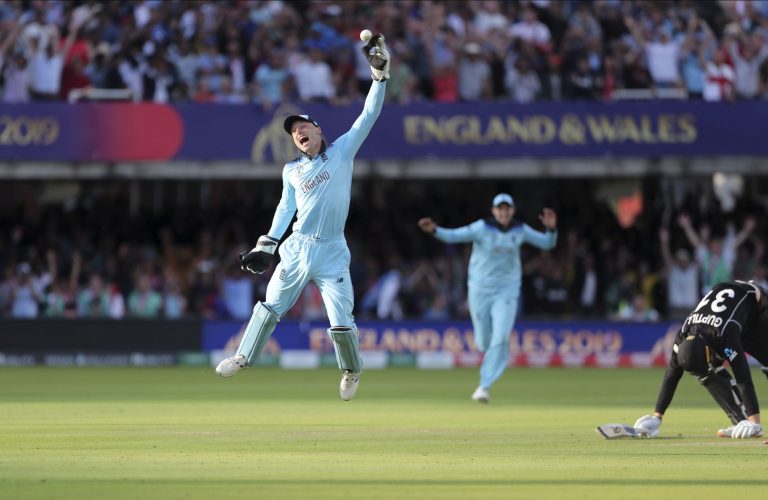
LONDON (AP) — In the 48th game of the Cricket World Cup, in the astonishing ninth hour of the final, with shadows creeping across the Lord’s pitch and the heartbeats of 28,500 spectators on pause, the outcome hung on one last ball.
The first ever Super Over after the first ever tied final in World Cup history brought the mounting tension to breaking point.
Two runs scored, and New Zealand would win the World Cup for the first time.
One or no runs scored, and England would win the World Cup for the first time.
How had it come to this?
After 100 regular overs of the final, the scores were tied on 241 when New Zealand ran out England’s last two batsmen on the last two balls.
An unprecedented Super Over decider was required, and the rules were displayed on the video boards for stumped spectators.
Teams nominate three batsmen, get only two wickets, and face one bowler.
Ben Stokes and Jos Buttler, who engineered England’s recovery from 86-4 with a century partnership, faced Trent Boult, who had just bowled the last regular over.
Stokes, who finished regulation on 84 not out, ran himself out of breath as he and Buttler scored 3, 1, 4, 1, 2, 4, each greeted by a roar from the home crowd. What a time to pull out England’s highest scoring over all day.
England huddled on the field.
“I encouraged them to smile, laugh, enjoy, because it was such a ridiculous situation where there was quite a lot of pressure in that particular moment,” captain Eoin Morgan said. “It was to release a bit of tension and the guys responded brilliantly.
“To play in a Super Over at the end of an extremely draining day takes a huge amount out of you, so it was, remain calm but make sure we enjoy this. Whether we win or lose, we have done incredible things.”
As England took the field, Buttler rechecked the rules with umpire Marais Erasmus. A tie in the Super Over would give England the trophy on a countback of boundaries and sixes in the 50-over final and Super Over. England led that count by 26-16. Erasmus told Buttler that New Zealand needed an ungettable 11 boundaries. Buttler told him they would try not to give the Kiwis even one.
Jofra Archer, the fast-bowling sensation for whom England changed its rules to clothe in blue just weeks before the tournament, charged up the Lord’s slope at Jimmy Neesham, the New Zealand allrounder who was close to retiring from cricket in 2017.
Archer started with a wide. Neesham then hit 2, a 6 into the Mound Stand, 2 off a Jason Roy misfield, 2, 1. Guptill only had to run, and was on strike for the first time.
One ball left. Trophy on the line.
Archer angled the delivery into the pads of Guptill, the batting star who has struggled to score in this World Cup.
Guptill guided the ball to deep midwicket, and scored one run. He turned for the second and glory but by the time he was halfway down the pitch, Roy’s throw was rocketing to wicketkeeper Buttler, who smashed the bails with Guptill out by at least three meters.
New Zealand captain Kane Williamson didn’t regret asking Guptill to bat.
“He is such a fast runner and that is all he had to do, and he was short by a little bit,” the skipper said. “Unfortunately, it didn’t happen. It is one of those days.”
Archer, playing only his 14th ODI, wheeled away to slide across the grass in joy.
“I was pretty sure I was going to bowl,” he said. “Heart’s still racing.”
Stokes, named the player of the final, was impressed with the bowler: “We backed the new kid, Jofra Archer, the talent that he’s got. He showed the world today.”
Buttler, who’d thrown his gloves in the air to hug as many teammates as possible, was unequivocal.
“I thought I’d seen everything in cricket,” he said. “That game was just ridiculous.”





